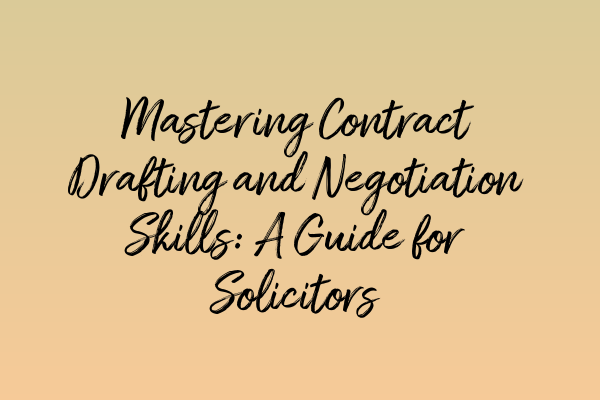Mastering Contract Drafting and Negotiation Skills: A Guide for Solicitors
Introduction
As a solicitor, having strong contract drafting and negotiation skills is essential for success in the legal profession. Contracts are the foundation of business transactions and legal relationships, and mastering the art of drafting and negotiating them can significantly enhance your reputation and career prospects. In this in-depth guide, we will explore the key strategies, techniques, and best practices that will help you excel in contract drafting and negotiation.
Understanding the Basics
Before diving into the intricacies of contract drafting and negotiation, it is crucial to have a solid understanding of the basics. A contract is a legally binding agreement between two or more parties that outlines the rights and obligations of each party. It is important to determine the intentions of the parties, the essential terms and conditions, and the scope and purpose of the contract.
Key Elements of Contract Drafting
When it comes to contract drafting, precision and clarity are paramount. A well-drafted contract should anticipate potential issues and clearly outline the rights and responsibilities of the parties involved. Here are some key elements that should be considered:
1. Clear and Concise Language: Use plain language to ensure that the contract is easily understood by all parties involved. Avoid complicated legal jargon that may confuse or mislead.
2. Defined Terms: Define key terms within the contract to prevent ambiguity and interpretation issues. Consistency is key in ensuring clear communication.
3. Scope of Work: Clearly define the scope of work or the obligations of each party. This will help avoid disputes or misunderstandings in the future.
4. Performance and Termination: Outline the performance expectations and conditions for termination. Setting clear guidelines for performance and termination can help prevent disputes down the line.
5. Remedies and Dispute Resolution: Include provisions for dispute resolution, such as mediation or arbitration, as well as remedies for breach of contract. This ensures that parties have a roadmap in case of disagreements.
Effective Negotiation Techniques
Negotiating a contract requires skill, tact, and an understanding of the needs and objectives of all parties involved. Here are some effective negotiation techniques to keep in mind:
1. Preparation: Before entering into negotiations, thoroughly research the other party, their interests, and any potential conflicts. This will help you anticipate their needs and negotiate effectively.
2. Active Listening: Actively listen to the other party’s concerns and interests. By understanding their perspective, you can find common ground and create mutually beneficial solutions.
3. Creative Problem-Solving: Think outside the box and explore alternative solutions that may meet the interests of both parties. Creating win-win scenarios can lead to more successful negotiations.
4. Building Rapport: Establishing a positive rapport with the other party can help foster better communication and trust. This can be achieved through active engagement, respectful communication, and finding common ground.
5. Flexibility and Compromise: Negotiation is about finding a balance between your client’s interests and the other party’s needs. Be willing to compromise on non-essential issues to reach a mutually satisfactory agreement.
Conclusion
Mastering contract drafting and negotiation skills is crucial for solicitors looking to excel in their legal careers. By understanding the basics, employing effective drafting techniques, and utilizing negotiation strategies, solicitors can create solid contracts that protect their clients’ interests and foster successful business relationships.
Remember, continuous improvement and staying updated on industry trends are also important for solicitors. Stay ahead by exploring related articles like “A Closer Look at the Bar Professional Training Course (BPTC),” “The Role of Technology in Modern Legal Practice,” “Financing Your Law Degree: Understanding Costs and Options,” “A Look into Prominent Law Firms in the UK,” and “Staying Ahead: Current Legal Industry Trends in the UK.”
Mastering contract drafting and negotiation skills is an ongoing process, and with practice and a dedication to professional development, solicitors can become experts in this critical area of law. So start honing your skills today and watch your career thrive!


Leave a Reply